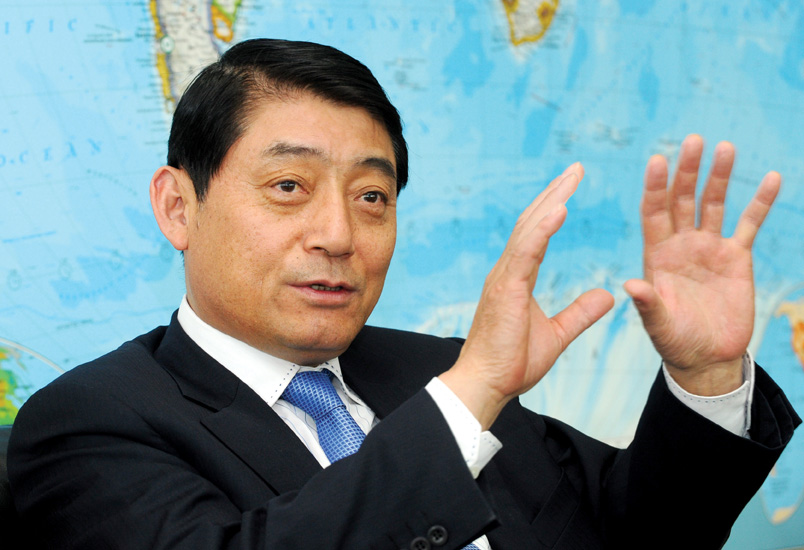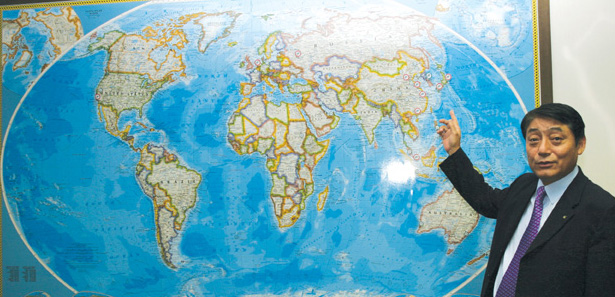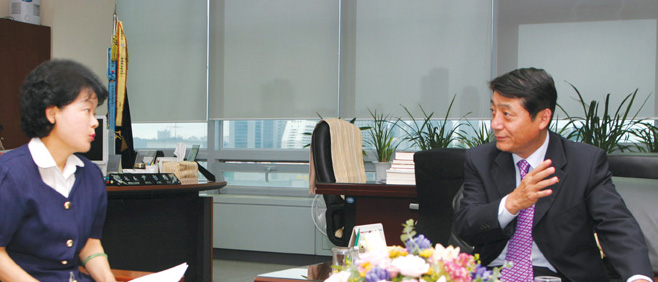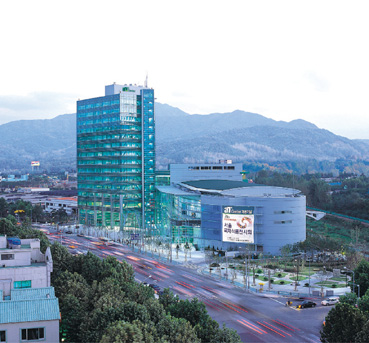Plans to Make Korean Foods Globally Known
Korea Agro-Fisheries Trade Corp. to speed up globalization of Korean foods and exports of farm products overseas
 In this exclusive written interview with NewsWorld, President Yoon Jang-bae of the Korea Agro-Fisheries Trade Corp. discusses the current state of the company¡¯s progress in its key operations in the area of controlling the supply side of farm products by storing them and supplying them around the country where supply is getting short, along with its support to export the products. He also talks about the company¡¯s ambitious plans to make Korean foods globally known by holding exhibitions.
In this exclusive written interview with NewsWorld, President Yoon Jang-bae of the Korea Agro-Fisheries Trade Corp. discusses the current state of the company¡¯s progress in its key operations in the area of controlling the supply side of farm products by storing them and supplying them around the country where supply is getting short, along with its support to export the products. He also talks about the company¡¯s ambitious plans to make Korean foods globally known by holding exhibitions.
Question: Can you explain to us what the Korea Agro-Fisheries Trade Corp. does for business?
Answer: The company was set up in 1967 as the Korea Agro-Fishery Development Corp. under government policies to develop both agriculture and fisheries in balance. But the name was changed in 1987 to the current one, to reflect that its main businesses would be related to stabilizing the prices of farm and fishery products and the logistical work of those products around the country.
In addition, the company has taken on more businesses to help both the farm and fishery communities in such areas as the exploration of overseas markets for their products and produce, introduction of export markets, trade information and financial support, among others, to promote their exports and expand their markets.
The company has also been engaged in cyber trading of farm and fishery products, revolutionizing the consumer and production areas¡¯ cooperative support and other related innovative trading systems. The aT also manages the supply and demand of products by operating large storage houses, along with its efforts to nurture the nation¡¯s food manufacturing industry by helping it to invigorate its operations and build infrastructure through its policies to globalize Korean foods.
Since the launch of the aT, it has firmly set up a framework for the food processing industry by nurturing food processing, storage and treatment facilities. Since the name of the company was changed to the current one in 1987, the company has focused mainly on stabilizing the prices of farm and fishery products.
When the environment for farming was changed under the World Trade Organization (WTO) regime in 1992, the company carried out various measures to support farm product exports. The company¡¯s sustained efforts paid off in 2008 with farm exports amounting to $4.4 billion, up 17.1 percent from the previous year, the largest in the history of Korean farm product exports.
The company began operating the aT center in Yangjae-dong, southern Seoul, as a logistics base for the export of farm and fishery products. The company has been paying special attention to the globalization of Korean foods, which help develop both the farm and fishery industries.
Q: Please tell us about your strategies for the globalization of Korean foods?
A: Korean foods have been getting the attention of people all over the world due to the desire for well being, health and a Korea-style fad in line with world food trends toward health and sensibility. Our strategies are to mix foods with arts to create and develop cultural commodities. A single menu item will be made for mass consumption through franchise systems, while complete dinners will be further developed to be offered at expensive restaurants.
We will also pick certain foods for certain area as a means to explore markets for those food items.
The promotional plans include the development of Korea food menus, the standardization of cooking and the training of professional cooks. The plans also include the building of infrastructure for the globalization of those Korean foods and the opening of a portal site for Korean foods in November.
The company will also introduce the certification system to further expand the number of Korean restaurants around the world and push to upgrade Korean restaurants overseas as Korean cultural institutes with the interiors designed with materials developed and supplied by the company.
The company will also step up its public relations activities designed to inform people of the superior nature of Korean foods through a number of plans including the discovery of Korean-style storytelling, its distribution and the development of contents linked to culture such as the performance of ¡°Bibimpop.¡± These activities will be expanded to various strategic cities in the world in connection with Korean diplomatic missions.
The four Korean foods, which the company selected, such as kimchi, bibimbap, fried rice cakes with hot sauces and traditional rice wines will be expansively promoted to the world, along with the further refinement of those traditional food items. The company has also been in the process of developing special Korean fusion cuisine jointly with Le Cordon Blue of France, a renowned cooking institute and Italy¡¯s ICIF.
Q: What can you say about the superiority and good Korean foods?
A: Our farm foods such as kimchi, bean pastes and other fermented foods are good as health foods. Kimchi, ginseng and fruit teas have world-class quality and have been recognized as renowned Korean foods. The U.S. magazine ¡°Health¡± selected kimchi as among the five healthiest foods in the world in 2006. Furthermore, reports said kimchi can prevent SARS, attracting great attention around the world. The world¡¯s five best health foods are Korean kimchi, Japanese nuts, Indian lentil beans, Spanish olive oil and Grecian yogurt.
When Japanese mountain climber Yuichiro Miura climbed to the top of Mt. Himalaya in his 70s, he had kimchi in a 30-kg bag with him and e kimchi all the time and built his body, reports said.
Modern people pick foods not only for their tastes, but also for their health contents, and Korean foods are just right for those trends in food selection. Obesity has become a huge problem around the world, especially in the United States, where one third of the people are considered obese.
Beans, fruit and vegetables have recently become the center of a food culture that stresses organic farming and health foods, while the consumption of meat is being reduced. Our farm products and foods are in line with the global well being trend and have many advantages, which can be shown off to the world with pride.
The aT Center will search for unique advantages that Korean farm-grown foods have and exploit them to find new markets. nw
President Yoon Jang-bae of the Korea Agro-Fisheries Trade Corp.
(Photos from Above) President Yoon explains
the company¡¯s strategy to export Korean foods and agro-fishery products on the global market chain
on a map.
President Yoon is holding an interview with President-Publisher Elizabeth M. Oh of NewsWorld. The aT Center in Yangjae-dong, Seoul.
3Fl, 292-47, Shindang 6-dong, Chung-gu, Seoul, Korea 100-456
Tel : 82-2-2235-6114 / Fax : 82-2-2235-0799